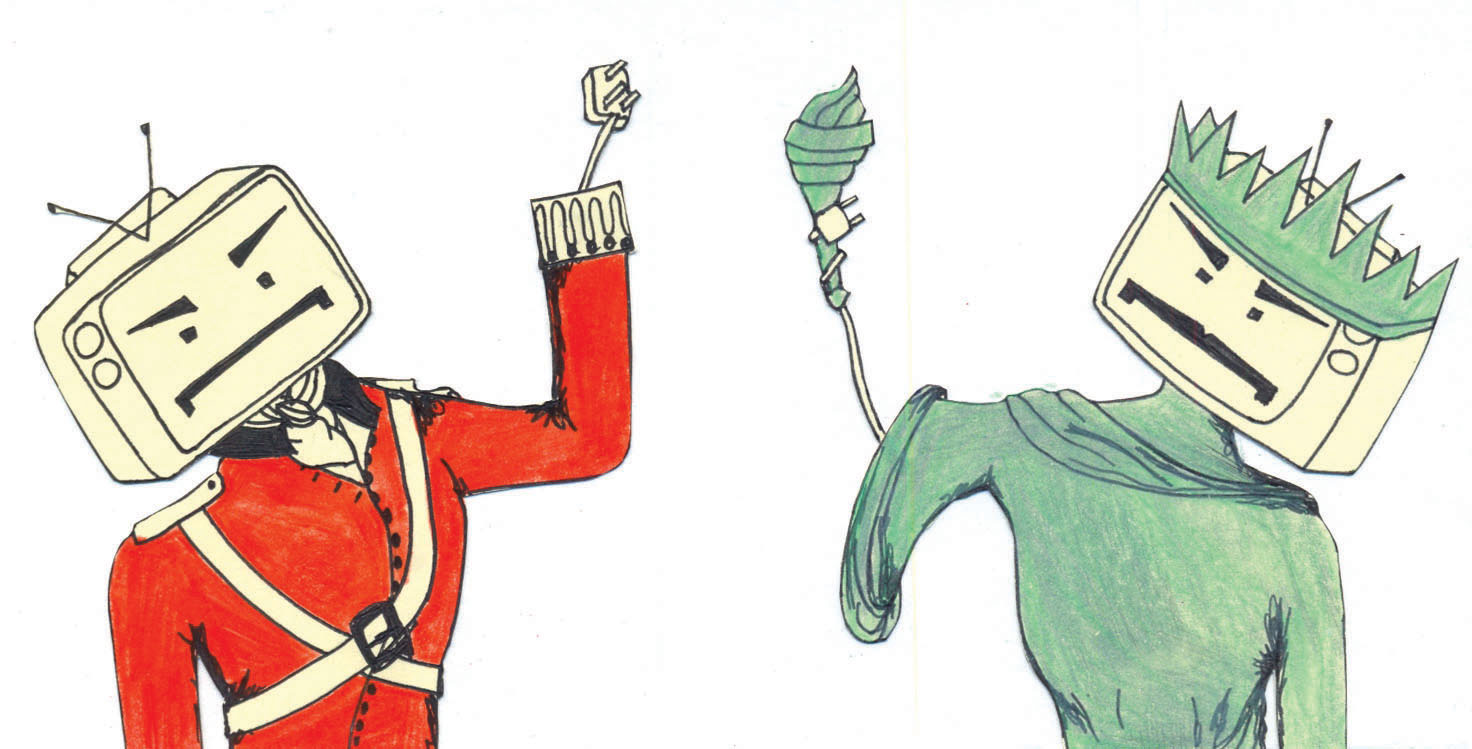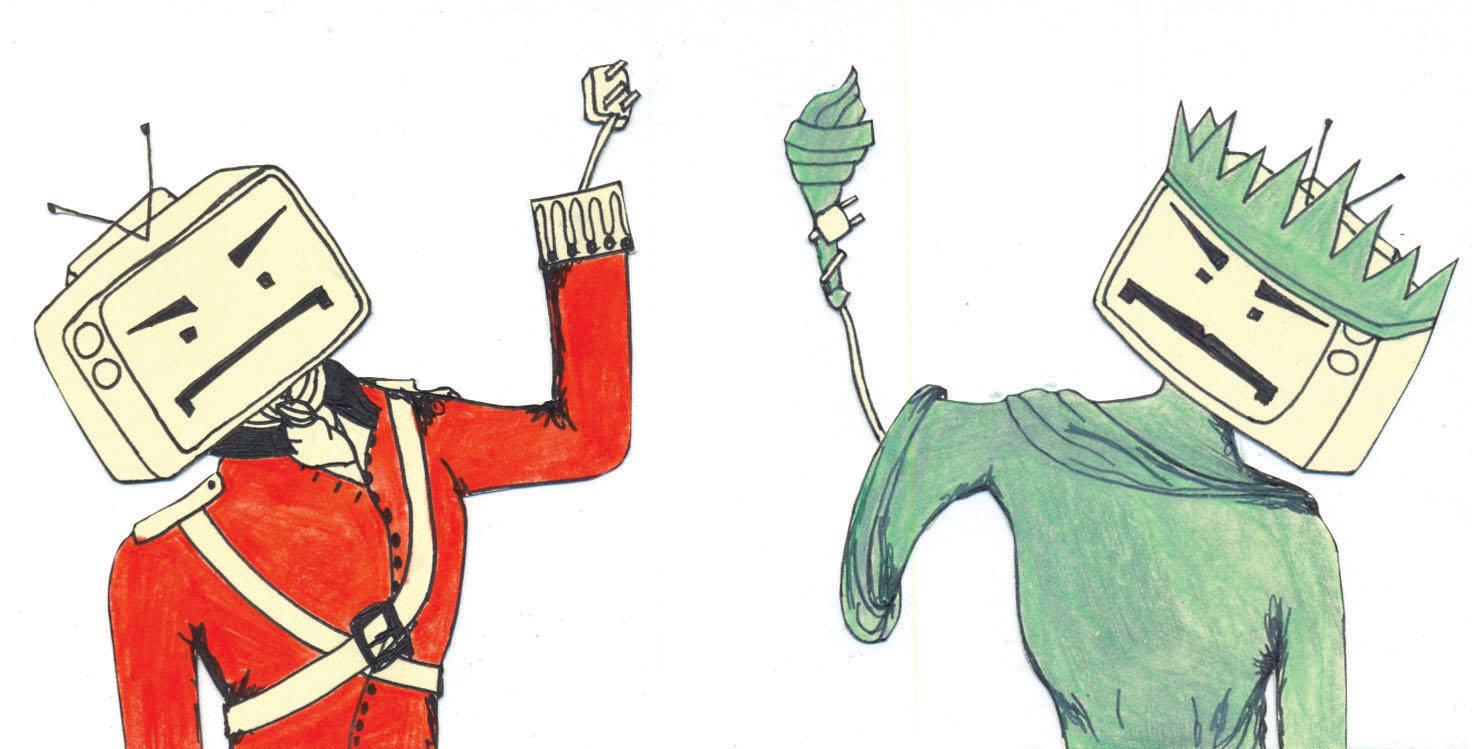 Tom Bonnick asks why British TV sits at the children’s table while its American cousin cuts the Christmas turkey.
Tom Bonnick asks why British TV sits at the children’s table while its American cousin cuts the Christmas turkey.
It occurred to me recently, sitting through one of an endless line of turgid crime dramas – probably on STV and with a rather pretentious, sub-Robert Ludlum-esque title like The Perseus Complication or The Plot Replica – that an awful lot of television is rubbish. This is, of course, nothing new: rubbish has always been broadcast, and while a public taste for Piers Morgan’s smug portrait lingers, it always will be. What struck me, however, was how much worse our TV is than that made by our neighbours across the Atlantic – or rather, as Americans can patently plumb the depths of crapness no less adeptly than us plucky Brits, how much better their programming is than ours. Lest anyone should think me ungrateful and unpatriotic, consider the following scenario. Imagine a television show about murders. This show, unlike most, isn’t about police trying to prevent them from happening, or even about trying catch the people who’ve done all the murders, but rather, about the tedious court proceedings that ensue once the seedily-unshaven perpetrator has been brought to justice. Now, if you will, imagine that this show runs for hundreds of years, inspires multiple spin-offs and becomes the longest-running primetime drama in our imaginary country… Schmamerica. Now imagine that the show is called Law and Order. Shocking as it will no doubt be to many of you, but an eerily similar set of events has taken place in the real world, leading up this February, when to its estimable canon a British addition was added to the L&O franchise, the imaginatively named Law and Order: UK. When I stumbled across the debut episode, not fully appreciating my folly, my initial reaction was not “Wow, this sure is a treatment which has translated seamlessly into a British setting”, but rather “My, the cast of The Bill certainly seem to have become marginally more attractive, no?” Clearly, none of the Laws and Orders have ever really been able to make much claim to artistic integrity, due to, literally the exact same sequence of events occurs in every single episode, but at least the original has its pride: it was bold, brash, expensively made; a bit stupid. Here was a formula whose success clearly had absolutely nothing to do with content whatsoever, whose demands on creativity were so low that characters were just given names that would describe their personality traits, and whose template was so robust that a new version could be churned out almost every other week. We still managed to arse it up. Evidently, British TV cannot compete when it comes to glossy, high-production-value police procedurals. The reasons for this are transparent enough: as a people, we are not that glossy, and our industry doesn’t have enough money for values. What is slightly more damning is that whereas the inability to convincingly produce CSI: Linlithgow is of no great concern, our programming looks to be found even more severely wanting in the quality stakes. Imagine a second show. This one is about the mafia: a sprawling, intense look at an entire mob family that distinguishes itself from its predecessors by refusing to conform to the crass stereotypes prevalent on TV when it first airs. Lets call it… The Bopranos. For many years, perceived wisdom was that The Sopranos was the greatest show on earth – Chaucerian in scope, Shakespearean in human understanding, wholly American in its depiction of New Jersey. In recent years, it has been under threat of being usurped by The Wire, the universally acclaimed genre-defying masterpiece that is in essence a ballad to a second American city, Baltimore – whose English lead, Dominic West, was to be found in late March on Radio 4, decrying the state of television at home. Where is all the good British drama? It seems absurd to think that we are just less capable of making good television, although strictly speaking, this is the case, and for the perennial excuse – economics. This is an industry in which, somewhat depressingly, most problems are solved by incomprehensibly large sums of money being thrown at them – not a viable option when the largest British television institution is publicly funded, and beholden to the whims of tabloid disposition as to how its finances ought to be distributed. Undoubtedly, the same creative potential exists in our island, and is allowed to flourish on a smaller scale – which is why we make such accomplished comedy (The Office; The Thick of It; Nathan Barley) and one-off specials, such as the recent adaptations of David Peace’s Red Riding novels shown on Channel 4 (but made independently), whose intelligence, depth and casting of Sean Bean have earned comparisons not to British TV, but to the more sophisticated narrative styles of The Wire and The Sopranos. It is often claimed – by that vague, un-disprovable group known as ‘they’, of course – that Now is a Golden Age of television. We may indeed be enjoying a small-screen renaissance, but – Red Riding aside – only, I find, courtesy of the willingness to invest that is demonstrated at HBO; rarely at home.

